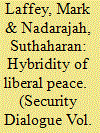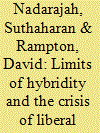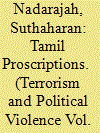|
|
|
Sort Order |
|
|
|
Items / Page
|
|
|
|
|
|
|
| Srl | Item |
| 1 |
ID:
117604


|
|
|
|
|
| Publication |
2012.
|
| Summary/Abstract |
Much contemporary analysis of world order rests on and reproduces a dualistic account of the international system, which is divided into liberal and non-liberal spaces, practices and subjectivities. Drawing on postcolonial thought, we challenge such dualisms in two ways. First, we argue that, as a specific form of governmental reason and practice produced at the intersection of the European and the non-European worlds, liberalism has always been hybrid, encompassing within its project both 'liberal' and 'non-liberal' spaces and practices. Second, through analysis of liberal engagement with diasporas, a specific set of subjects that occupy both these spaces, we show how contemporary practices of transnational security governance work to reproduce the hybridity of liberal peace. The article demonstrates the shifting conditions for local agency in relations and practices that transcend the simple dualism between liberal and non-liberal spaces, in the process showing how practices of transnational security governance also reproduce diasporas as hybrid subjects. The argument is illustrated with reference to the Tamil diaspora and the Sri Lankan state's war against the Liberation Tigers of Tamil Eelam.
|
|
|
|
|
|
|
|
|
|
|
|
|
|
|
|
| 2 |
ID:
060188


|
|
|
| 3 |
ID:
139568


|
|
|
|
|
| Summary/Abstract |
Hybridity has emerged recently as a key response in International Relations and peace studies to the crisis of liberal peace. Attributing the failures of liberal peacebuilding to a lack of legitimacy deriving from uncompromising efforts to impose a rigid market democratic state model on diverse populations emerging from conflict, the hybrid peace approach locates the possibility of a ‘radical’, post-liberal, and emancipatory peace in the agency of the local and the everyday and ‘hybrid’ formations of international/liberal and local/non-liberal institutions, practices, and values. However, this article argues, hybrid peace, emerging as an attempt to resolve a problem of difference and alterity specific to the context in which the crisis of liberal peacebuilding manifests, is a problem-solving tool for the encompassment and folding into globalising liberal order of cultural, political, and social orders perceived as radically different and obstructionist to its expansion. Deployed at the very point this expansion is beset by resistance and crisis, hybrid peace reproduces the liberal peace's logics of inclusion and exclusion, and through a reconfiguration of the international interface with resistant ‘local’ orders, intensifies the governmental and biopolitical reach of liberal peace for their containment, transformation, and assimilation.
|
|
|
|
|
|
|
|
|
|
|
|
|
|
|
|
| 4 |
ID:
159893


|
|
|
|
|
| Summary/Abstract |
Conventional analyses of terrorism proscription rely on conceptions of policy in terms of bureaucratic institutions and processes functioning according to means-end rationality, and law as an institutionalised body of rules expressive of sovereign power. By contrast, this article argues that the workings of Western terrorism proscription are inseparable from and deeply conditioned by situated interpretations of the contexts and dynamics within which West-led interventions for global stability—equated with liberal order—are pursued. Predicated on a seemingly self-evident division between “liberal” conduct, actors, and practices and illiberal ones which threaten the former, the production of good order requires the strengthening of the former, and the disciplining, transformation, or destruction of the latter. However, categorisations as “liberal” or “non-liberal” are not derived from “objective” criteria, but always mutually dependent on the situated interpretations by (self-recognised) liberals of the contexts within which they are intervening. Taking an interpretive approach that treats state action as situated practice, the article traces Western states’ security engagement with Sri Lanka before, during, and after the armed conflict (1983–2009) to show how changing calculations for liberal peace there governed evolving proscription practices in relation to the LTTE and the Tamil diaspora.
|
|
|
|
|
|
|
|
|
|
|
|
|
|
|
|
|
|
|
|
|